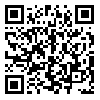BibTeX | RIS | EndNote | Medlars | ProCite | Reference Manager | RefWorks
Send citation to:
URL: http://rjms.iums.ac.ir/article-1-2715-en.html
Background: The aim of this study was to
compare the effects of fasting during Ramadan (as a dietary pattern) and
regular aerobic exercise on LCN2,
lipid profile and insulin resistance indexes in
non-active obese men.
Methods: This
study was a semi-experimental research with a repeated measures design. In this
study 18 obese men with a range of 40 to 50 years old and BMI over 30 kg per
square meter after a public call among of 70 subjects were selected randomly.
Subjects were divided into fasting (N=9) and fasting and exercise (N=9) groups. The
first group did only fasting and the second group did exercise for
27 sessionsin
addition to fasting.
In order to evaluate the changes in the month of Ramadan, blood
samples were taken four different times.
Repeated
measures analysis of variance in the level of p <0/05 were used to analyse
the data.
Results: Results
showed that LCN2 levels in both groups decreased in Ramadan month however, this reduction
was significant only in the fasting and exercise group (p<0/05). Also, both
groups had decreased levels of insulin resistance that significant
reduction was noticed in the fasting group (p<0/05). In
addition, LCN2 levels in the fourth week of Ramadan was significantly
associated with levels of insulin resistance in obese men (p<0/05).
Conclusions: Results
of the research showed that reduced levels of LCN2 by both fasting and exercise
may lead to decrease of insulin resistance in obese men.





